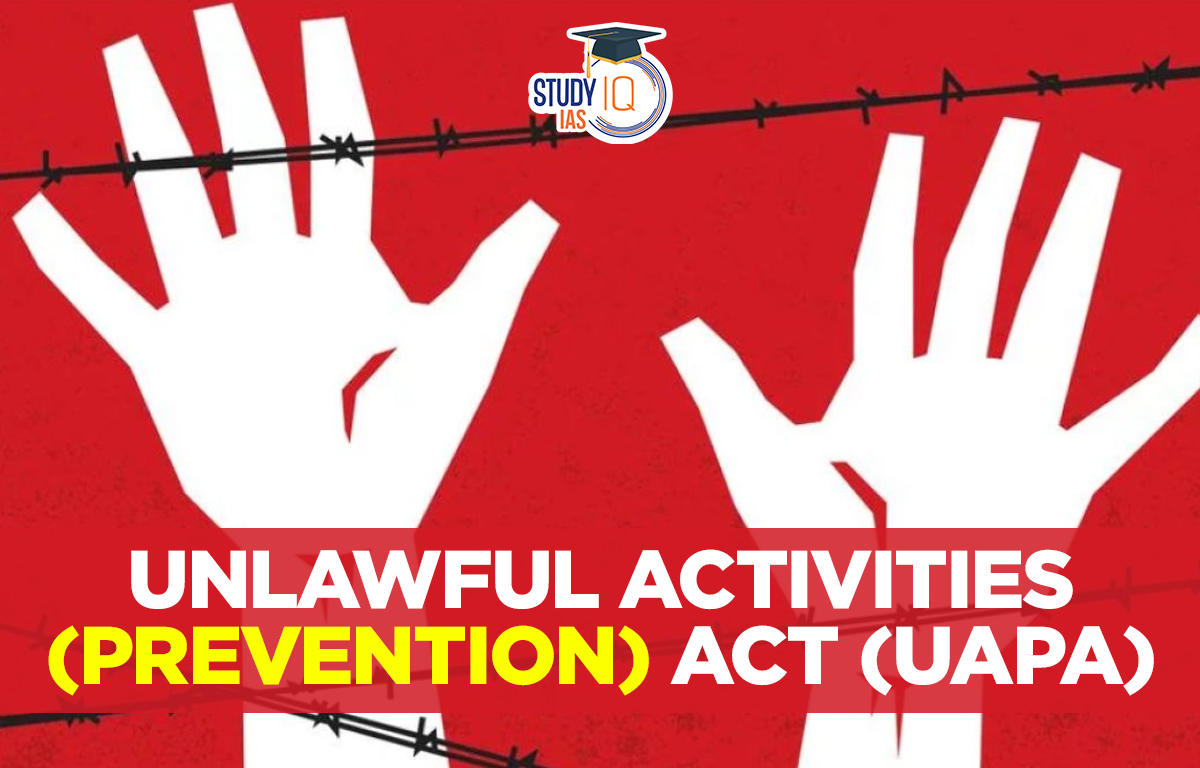Table of Contents
Context: A three-judge bench of the Supreme Court ruled that even a mere membership of a banned association is sufficient to constitute an offence under the Unlawful Activities (Prevention) Act 1967.
What is the Ruling of Supreme Court?
- Section 10(a)(i) of the UAPA: The court upheld the constitutional validity of Section 10(a)(i) of the UAPA and said that the provision is in consonance with the fundamental right to free speech.
- The section reads: If an association is declared unlawful under the UAPA and a person remains a member of that association, they can be punished with up to two years in prison and a fine.
- Doing Away with Distinction: The court overruled three past decisions on this aspect which had distinguished between active and passive membership of an unlawful association and the crucial difference between advocacy and incitement to violence.

About the Unlawful Activities (Prevention) Act (UAPA), 1967
- Aim: The act aims at effective prevention of unlawful activities and associations in India.
- Unlawful activity refers to any action taken by an individual or association intended to disrupt the territorial integrity and sovereignty of India.
- Key provisions of the UAPA, 1967:
- Section 3 of UAPA: It empowers the central government to declare an association as unlawful if it believes that the association is involved in unlawful activities that threaten the sovereignty, unity, and integrity of India.
- Section 43D (5) of the Act: It leaves very little room for judicial reasoning, and makes the grant of bail virtually impossible under UAPA.
- It requires the court to provide an opportunity to the public prosecutor to oppose the bail application and to not release the accused on bail if there are reasonable grounds for believing that the accusation is prima facie true.
- It has death penalty and life imprisonment as highest punishments.
- Under the UAPA, the investigating agency can file a charge sheet in maximum 180 days after the arrests and the duration can be extended further after intimating the court.
- Applicability: Under UAPA, both Indian and foreign nationals can be charged. It will be applicable to the offenders in the same manner, even if crime is committed on a foreign land, outside India.
- 2004 Amendment Act: The 2004 amendment, added “terrorist act” to the list of offences to ban organizations for terrorist activities.
- Till 2004, “unlawful” activities referred to actions related to secession and cession of territory.
- 2019 Amendment Act:
- It allows the government to label people as terrorists if they commit or participate in terrorist acts, plan terrorist attacks, promote terrorism, or are otherwise involved in terrorism.
- The Act empowers the Director General of National Investigation Agency (NIA) to grant approval of seizure or attachment of property when the case is investigated by the said agency.
- The Act empowers the officers of the NIA, of the rank of Inspector or above, to investigate cases of terrorism in addition to those conducted by the DSP or ACP or above rank officer in the state.
- A new item has been added to the list of circumstances in which terrorism is committed: The International Convention for the Suppression of Acts of Nuclear Terrorism (2005).

Stats IQ: The Working of UAPA
- Arrests and Conviction: A total of 24,134 people were arrested and faced trial under the UAPA between 2016 and 2020and only 212 of them were convicted.
- Acquittal: 386 people accused under the UAPA were acquitted by different courts.
- State-wise: Of the 1,321 arrests made on UAPA charges in 2020, the maximum was in UP (361), followed by J&K (346) and Manipur (225).
- Age-wise: Around 53% of the total 4,690 people arrested under the UAPA between 2018 and 2020 were aged between 18 and 30, while 13 were below 18 and 10 above 60 years.
What are the Issues Surrounding UAPA?
- Misuse: Critics argue that the UAPA is often used to suppress political dissent and target activists, journalists, and academics who are critical of the government.
- Lack of transparency: The UAPA allows for prolonged detention without bail, raising concerns about transparency and due process.
- Vague definitions of unlawful activities: The UAPA defines “unlawful activities” broadly, which can be interpreted in a subjective manner, leading to a potential for misuse.
- Federalism: According to Schedule VII, police is a state subject. Giving NIA investigative and asset-attachment powers is seen as encroaching on governmental authority.
- Denied Bail: In accordance with Section 43D (5), a suspect cannot be released on bail if the court determines that there are good grounds to assume that the allegations are accurate at face value.
- Burden of Proof: The burden of proof is on the accused, as opposed to other criminal offenses where the burden of proof rests with the State.
- Low Conviction Rate: As per the PUCL (People’s Union for Civil Liberties) report 2022, the problem of bail and conviction rates was at the core of “abuse” of UAPA.
- This is because of the slow working of the NIA court resulting in the low conviction rate.
- No reporting of Crime incidence in some cases: As per the PUCL report, about 64% of the cases involving Section 18 charges (penalty for conspiracy, etc.) had no incidents that have been documented.
Way Forward
- The freedom of the individual and national security ought to coexist in harmony. To maintain both is essential to India’s democracy.
- The Court must decide whether the scope and effects of UAPA are noticeably disproportionate to its stated objectives.
- A law that successfully combats terrorism while adhering to the requirements of our Constitution is required. A top priority should be the capacity to locate, eliminate, and prosecute terrorists.
Conclusion
- Preventing Abuse: Terrorism is undeniably a serious threat that must be addressed with strict anti-terrorism legislation. But only if the provisions of the UAPA are followed in letter and spirit, rather than being abused to falsely accuse individuals.
- Drawing the Line between Individual Freedom and the State’s Obligation to Provide Security: Drawing the line between individual freedom and the state’s obligation to provide security is a classic dilemma. Officers are responsible for maintaining professional integrity, adhering to the principle of objectivity, and avoiding any misuse.
- Judicial Review: The judiciary has a larger role to play here in carefully examining cases of alleged misuse. Judicial review should be used to check for arbitrariness and subjectivity in the law.


 UPSC Calendar 2025 Released at upsc.gov....
UPSC Calendar 2025 Released at upsc.gov....
 First IAS Officer of India Satyendranath...
First IAS Officer of India Satyendranath...
 BPSC Post List 2024, Check out Salary Wi...
BPSC Post List 2024, Check out Salary Wi...

















